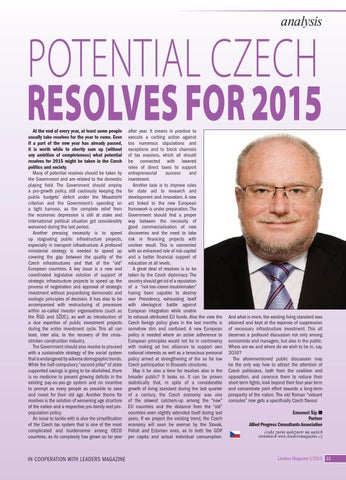analysis
POTENTIAL CZECH
RESOLVES FOR 2015 At the end of every year, at least some people usually take resolves for the year to come. Even if a part of the new year has already passed, it is worth while to shortly sum up (without any ambition of completeness) what potential resolves for 2015 might be taken in the Czech politics and society. Many of potential resolves should be taken by the Government and are related to the domestic playing field. The Government should employ a pro-growth policy, still cautiously keeping the public budgets’ deficit under the Maastricht criterion and the Government’s spending on a tight harness, as the complete relief from the economic depression is still at stake and international political situation got considerably worsened during the last period. Another pressing necessity is to speed up stagnating public infrastructure projects, especially in transport infrastructure. A profound ministerial strategy is needed to speed up covering the gap between the quality of the Czech infrastructures and that of the “old” European countries. A key issue is a new and coordinated legislative solution of support of strategic infrastructure projects to speed up the process of negotiation and approval of strategic investment without jeopardising democratic and ecologic principles of decision. It has also to be accompanied with restructuring of processes within so-called investor organisations (such as the ŘSD and SŽDC), as well as introduction of a due expertise of public investment projects during the entire investment cycle. This all can lead, inter alia, to the recovery of the crisisstricken construction industry. The Government should also resolve to proceed with a sustainable strategy of the social system that is endangered by adverse demographic trends. While the half-compulsory “second pillar” of state supported savings is going to be abolished, there is no medicine to prevent growing deficits in the existing pay-as-you-go system and no incentive to prompt as many people as possible to save and invest for their old age. Another theme for resolves is the solution of worsening age structure of the nation and a respective pro-family and propopulation policy. An issue to tackle with is also the simplification of the Czech tax system that is one of the most complicated and burdensome among OECD countries, as its complexity has grown so far year
IN COOPERATION WITH LEADERS MAGAZINE
after year. It means in practice to execute a curbing action against too numerous stipulations and exceptions and to block channels of tax evasions, which all should be connected with lowered rates of direct taxes to support entrepreneurial success and investment. Another task is to improve rules for state aid to research and development and innovation. A new act linked to the new European framework is under preparation. The Government should find a proper way between the necessity of good commercialisation of new discoveries and the need to take risk in financing projects with unclear result. This is connected with an enhanced role of risk capital and a better financial support of education at all levels. A great deal of resolves is to be taken by the Czech diplomacy. The country should get rid of a reputation of a “not-too-clever-troublemaker” having been capable to destroy own Presidency, exhausting itself with ideological battle against European integration while unable to exhaust attributed EU funds. Also the view the Czech foreign policy gives in the last months is somehow dim and confused. A new European policy is needed where an active adherence to European principles would not be in controversy with making ad hoc alliances to support own national interests as well as a tenacious personal policy aimed at strengthening of the so far low Czech participation in Brussels structures. May it be also a time for resolves also in the broader public? It looks so. It can be proven statistically that, in spite of a considerable growth of living standard during the last quarter of a century, the Czech economy was one of the slowest catchers-up among the “new” EU countries and the distance from the “old” countries even slightly extended itself during last years. If we project the existing trend, the Czech economy will soon be overrun by the Slovak, Polish and Estonian ones, as to both the GDP per capita and actual individual consumption.
And what is more, the existing living standard was attained and kept at the expense of suppression of necessary infrastructure investment. This all deserves a profound discussion not only among economists and managers, but also in the public. Where are we and where do we wish to be in, say, 2030? The aforementioned public discussion may be the only way how to attract the attention of Czech politicians, both from the coalition and opposition, and convince them to reduce their short-term fights, look beyond their four-year term and concentrate joint effort towards a long-term prosperity of the nation. The old Roman “videant consules” now gets a specifically Czech flavour. Emanuel Šíp Partner Allied Progress Consultants Association české znění naleznete na našich stránkách www.leadersmagazine.cz
Leaders Magazine I/2015 33
